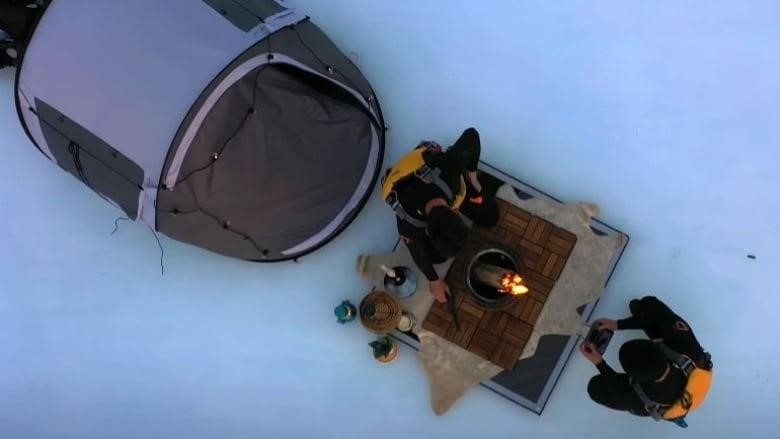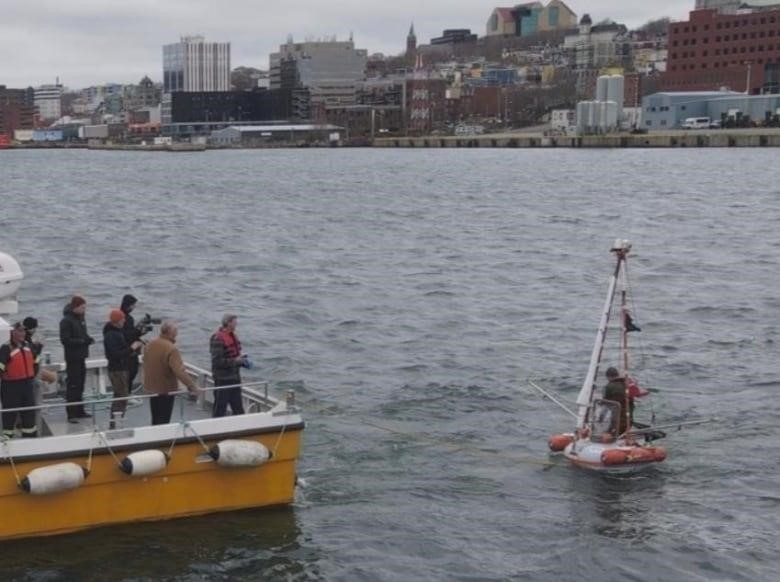
Adventurers are drawn to the province
Newfoundland and Labrador, which are on the edge of North America, have always been a hard place for professional and amateur adventurers to pass up.
But the number of high-profile adventures that have gone wrong in recent months is giving new life to an old debate about who should pay when high-risk adventures go wrong.
The answer is clear, says Dag Friis, a marine consultant and retired professor of ocean and marine engineering at Memorial University.
Friis said, “It would be responsible for these people to put up big bonds to cover at least a big part of the costs.”
But the federal government in Canada pays for search and rescue operations, no matter how dangerous they are.
Last month, the Canadian and U.S. coast guards were sent to find the five people who were on OceanGate’s Titan submersible when it failed to reach the Titanic wreck. The whole world watched this happen live.
Andrew Bedwell of Lancashire, England, set out in May to break the record for the smallest boat to cross the Atlantic. He used a one-meter fiberglass yacht, which is about the size of a small bathtub. Just a few hours later, when the boat started taking on water, the Canadian Coast Guard came to help.

Also in May, someone from the Twillingate area posted a picture of two men camping on top of a nearby iceberg, which made people worried. People were worried because icebergs can flip over quickly, which put them in a very dangerous situation.
Last week, a British couple, Deborah and Mike Scholes, were forced to make an emergency landing in central Newfoundland because of technical problems. The Joint Rescue Coordination Centre in Halifax came to their aid. The two people were trying to cross the Atlantic Ocean in a hot-air balloon.
‘Remarkably clueless
When CBC News found the two campers on the iceberg, Ethan Harold and Ammar Alkassm of Rochester, New York, they were surprised by the negative response to their adventure.
“There are a lot of dangerous things in life that we encourage. For instance, the UFC, boxing,… “A lot of people die every year trying to climb Everest, but they do it because it’s something they really want to do,” said Harold.
Some critics asked if they had thought about how dangerous it would be for search and rescue workers if the iceberg broke up or turned over and they had to go help.
Harold said that they don’t think other people should try what they did, but he insisted that they were well prepared and picked an iceberg close to shore that hadn’t moved in days.
Will Gadd is a professional ice climber and extreme athlete from Canmore, Alberta. He has climbed glaciers in Greenland and Kilimanjaro.
After seeing Harold and Alkassm’s YouTube video about their iceberg adventure, Gadd said that the two were very oblivious to the risks.
Gadd said, “Camping on an iceberg is, to put it bluntly, stupid.” He also said, “They were very stupid.”
“They are unstable by nature. They’re melting from the bottom up and from the top down. And they’ll turn around. just a question of when.”
Gadd has climbed up the sides of icebergs near Newfoundland and Greenland. He says it was very dangerous and not something he wants to do again.
But Gadd said he had a team with a dinghy and a main boat standing by in case something went wrong. They were wearing dry suits and survival gear the whole time.
TA Loeffler has been studying risk management for more than 30 years. She teaches outdoor education and recreation at Memorial University’s school of human kinetics and recreation. She has climbed the highest mountains in 20 different countries.
These activities come with a lot of risks and rewards, and Loeffler said that it is hard to figure out which risks are acceptable and which are not.
“For me, climbing Everest was the result of a lot of skill and practice over many years.”
But she doesn’t think that anyone will come to her rescue on any of her trips if she needs help.
“There is a fee for me to be there. “If I need to be rescued, I’ll have to pay for it myself or my insurance will cover it,” she said. “Again, if I want to climb on some of the highest peaks in the United States, I need to get a permit and either carry insurance or put up a rescue bond.”
Merv Wiseman worked as a search and rescue coordinator for the Canadian Coast Guard before he retired. He knows how dangerous it can be to do more rescues in a harsh climate.
Wiseman said it has not been easy to find a good balance between a person’s right to take risks and the cost of search and rescue operations.
“Unless there’s some kind of enforcement that says, ‘Look, if you’re going to do this, you have to pay for it or…,’ I don’t think it will happen.” show that you are capable of doing the activity and that safety precautions are taken.”
WATCH: Should people who like to take risks pay for their rescue?
Wiseman said that there are two things that have been talked about for a long time: the cost to the public purse of these rescues and the risk to the responders in dangerous situations.
Wiseman said that the resources are often used up to the point where they can’t be used any more. This is also true of the people who work with the resources.
“One of my biggest worries is trying to reduce the amount of risk I would put a rescuer in,” said Gadd.
But he says that the cost of rescuing adventurers is small compared to the high cost of things like smoking, eating badly, and not getting enough exercise.
“It’s like having heart disease or being sad. “All of that costs a lot of money,” Gadd said. “So, from a cost standpoint, I don’t really agree with that argument.”
As adventure tourism becomes more popular in Newfoundland and Labrador, Loeffler said it might be time for the province to teach people about the risks that come with some activities.
“We’re used to people being in danger because of their jobs,” Loeffler said.”Now that more people are coming from far away, some of them may not know how hard our adventure environment is.”
Find out more from CBC Newfoundland and Labrador
